

EPR Governance for Building Clinician Trust
By making the EPR and related technologies and content more accessible, Birmingham and Solihull Mental Health Foundation Trust was able to increase their clinicians’ overall satisfaction with the EPR.
Publish Date: 05/09/2023
| Cost to Implement: | $$ - Budgeted Cost |
| Time to Implement: | >2 years. |
Program Goals
- Improve overall clinician satisfaction with the EPR
Organization Outcomes
- Increased physician Net EPR Experience Score (NEES) from 3.9 to 32.7
- Increased nurse NEES from 25.1 to 38.1
Collaborative-Verified Best Practices
- Ongoing EHR Education
- Clinician Relationships and Communication
What The Trust Mental Health Did
Birmingham and Solihull Mental Health Foundation Trust (the Trust) believed that small changes could increase EPR satisfaction. They introduced a new intranet, created more accessible training by segmenting the training into relevant and manageable topics that could be accessed individually and on demand, upgraded the EPR system, and improved communication through frequent and consistent updates.
How Birmingham and Solihull Mental Health Did It
Access the feedback of
500,000+ clinicians worldwide
Access the feedback of
500,000+ clinicians worldwide
Here is my information:
Featured in Learning Tracks
Topics
Clinician Relationships & Communication, EHR Governance, Ongoing EHR EducationReader Responsibility
These perspectives are shared to facilitate better collaboration and communication between members of the Arch Collaborative. We encourage organizations to thoughtfully adjust their current operations based on their own experience, the findings of this research, and other complementary sources of information.
Copyright Infringement Warning
This report and its contents are copyright-protected works and are intended solely for your organization. Any other organization, consultant, investment company, or vendor enabling or obtaining unauthorized access to this report will be liable for all damages associated with copyright infringement, which may include the full price of the report and/or attorney’s fees. For information regarding your specific obligations, please refer to the KLAS Data Use Policy.

Arch Collaborative Mission
Unlock the potential of EMR solutions to revolutionize healthcare efficiency and care-quality improvements by facilitating collaboration, measurement, and shared learning.
The Arch Collaborative is committed to finding and sharing healthcare technology best practices that forward the efforts of the quadruple aim in healthcare. The engine of the Arch Collaborative is the insights and feedback of thousands of clinicians and caregivers around the world.
Learn more about the Arch Collaborative: https://klasresearch.com/arch-collaborative
The Arch Collaborative is a service of KLAS Research: klasresearch.com
About Arch Collaborative Case Studies
Arch Collaborative case studies are focused on highlighting success that Collaborative participants achieve with or through healthcare technology. They are meant to briefly advertise member success and act as starting points for ongoing communication and collaboration between member organizations.
Case studies are typically published when (1) a verified outcome is recorded (and often verified through the Collaborative survey) and (2) the approach or steps to achieving that outcome aren’t commonly known and would be helpful to other organizations.
All Collaborative members and participants are invited to submit case studies by working with their KLAS guide.
All case studies can be viewed at: https://klasresearch.com/learningcenter/casestudies
 |
KLAS | ® |


